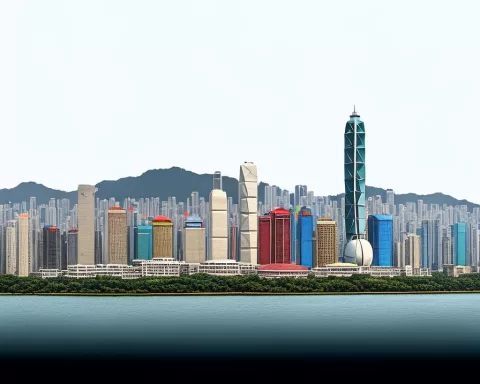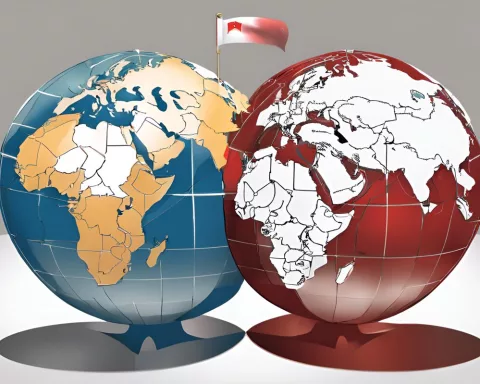China’s talks with Saudi Arabia and South Africa are like building strong bridges between nations. These discussions focus on important areas like energy and digital trade, helping China grow its influence while navigating tough trade challenges with the U.S. In Saudi Arabia, China is eager to secure energy supplies, while in South Africa, they aim to boost cooperation within global groups like the G20. Despite the ongoing trade war with the U.S., these partnerships show China’s commitment to supporting growth and connection in a rapidly changing world.
What is the significance of China’s economic dialogues with Saudi Arabia and South Africa?
China’s economic dialogues with Saudi Arabia and South Africa signify strengthened trade relations, focusing on energy, infrastructure, and digital trade. These partnerships enhance China’s global economic influence while addressing challenges posed by the escalating US-China trade war, fostering mutual growth and cooperation in a shifting global landscape.
In a world where international relations and economic strategies are constantly changing, China’s recent engagements with Saudi Arabia and South Africa stand out as significant markers of global trade relations. These discussions, led by China’s Commerce Minister Wang Wentao, signal China’s intent to deepen connections with key global economies while managing the intricacies of global tariffs and economic policies effectively.
Strengthening Sino-Saudi Economic Bonds
China’s conversation with Saudi Arabia aimed to reinforce trade relations with nations within the Gulf Cooperation Council (GCC). This discussion is a continuation of the enduring narrative of cooperation between China and Saudi Arabia. Historically, the partnership between the two countries has been grounded in energy-related interests. Saudi Arabia, being one of the largest oil producers globally, has found a steadfast partner in China, which has a growing demand for energy.
During these crucial discussions, China showcased its commitment to expanding trade with GCC countries by focusing on energy, infrastructure, and digital trade. This triad of cooperation highlights the diverse nature of contemporary economic relationships. The framework of this dialogue is reminiscent of the modern Silk Road initiative, aimed at rejuvenating ancient trade pathways through contemporary infrastructure projects. Through investments in Gulf infrastructure, China not only ensures its energy security but also paves the way for wider economic engagement.
In this realm, digital trade emerges as a vital frontier. The global pandemic has accelerated the pace of digital transformation, and China’s emphasis on digital trade with Saudi Arabia reflects a progressive outlook. By nurturing digital economies, the two countries are working towards developing sustainable growth models that are less reliant on fluctuating commodities.
Enhancing the China-South Africa Partnership within Global Arenas
China’s engagement with South Africa painted a broader picture of multilateral cooperation. The conversation with South Africa underlined the importance of global platforms like the G20 and BRICS, which are instrumental in shaping global economic policies. These platforms serve not just as diplomatic stages but as critical avenues for fostering global economic cooperation.
South Africa, serving as a gateway to the African continent, holds a strategic position for China. The dialogue focused on collaborative efforts within these platforms to facilitate open trade and inclusive economic growth. This partnership is rooted in the historical context of South-South cooperation, aiming to drive development through mutual support among developing nations.
Reflecting on a visit to Cape Town, one can observe the city’s bustling ports and vibrant marketplaces as clear indicators of South Africa’s dynamic trade environment. The partnership with China seeks to tap into this potential, driving economic growth through strengthened trade relations.
Trade War Escalations: Global Market Repercussions
Parallel to these constructive dialogues, a significant development occurred. China declared its decision to increase tariffs on US goods to 125 percent. This action, a direct countermeasure to US “reciprocal tariffs,” intensified the ongoing trade war between the two economic giants. The fallout from this decision rippled through global markets, inducing volatility in European stocks and affecting markets in Tokyo and Seoul.
The trade war, rooted in protectionist policies, poses a threat to the stability of global trade. China’s retaliatory measures are not just reactions but strategic moves to safeguard its economic interests. The resultant market volatility is a stark reminder of the interconnected nature of today’s economies. Actions in one part of the globe can send shockwaves across continents, impacting markets and economies globally.
Looking Ahead: Future Prospects and Challenges
As we navigate through the intricate world of economic relations, it’s crucial to consider the broader implications of these dialogues and trade policies. China’s interactions with Saudi Arabia and South Africa underscore its strategic foresight in cultivating robust economic partnerships. These relationships are built not merely on transactions but on a foundation of mutual growth and shared aspirations.
However, the escalating trade war with the United States presents considerable challenges. It highlights the fragility of global trade systems and the pressing need for diplomatic resolutions. As markets react to these developments, the world watches with bated breath, anticipating the next moves in this high-stakes economic game.
In conclusion, China’s recent dialogues with Saudi Arabia and South Africa offer insight into the strategic depth of contemporary economic relations. They reflect a blend of historical ties, current challenges, and future aspirations. As global dynamics continue to shift, these partnerships will be instrumental in shaping the economic landscape of the 21st century.
“`markdown
What is the significance of China’s economic dialogues with Saudi Arabia and South Africa?
China’s economic dialogues with Saudi Arabia and South Africa signify strengthened trade relations, focusing on energy, infrastructure, and digital trade. These partnerships enhance China’s global economic influence while addressing challenges posed by the escalating US-China trade war, fostering mutual growth and cooperation in a shifting global landscape.
How does China plan to strengthen its economic ties with Saudi Arabia?
China aims to reinforce its economic bonds with Saudi Arabia through discussions centered on energy, infrastructure, and digital trade. By investing in Gulf infrastructure and nurturing digital economies, China seeks to ensure energy security while promoting sustainable growth models that are less reliant on commodity fluctuations.
What role does South Africa play in China’s economic strategy?
South Africa serves as a strategic partner for China, acting as a gateway to the African continent. The economic dialogue emphasizes collaboration within global platforms like the G20 and BRICS to facilitate open trade and inclusive economic growth, reflecting a commitment to South-South cooperation among developing nations.
How has the US-China trade war impacted China’s economic dialogues with other countries?
The ongoing trade war with the U.S. has intensified challenges for China, prompting it to seek stronger economic partnerships with countries like Saudi Arabia and South Africa. By diversifying its trade relationships, China aims to mitigate risks associated with tariffs and protectionist policies imposed by the U.S., enhancing its economic resilience.
What are the potential repercussions of China’s tariff increase on U.S. goods?
China’s decision to raise tariffs on U.S. goods to 125 percent is a direct countermeasure to U.S. tariffs and has led to increased volatility in global markets. This action could impact European stocks and markets in Asia, highlighting the interconnected nature of global economies and the potential for significant ripple effects across continents.
What does the future hold for China’s economic partnerships with Saudi Arabia and South Africa?
Looking ahead, China’s economic partnerships with Saudi Arabia and South Africa are poised to evolve, driven by a shared vision of mutual growth and collaboration in key sectors. However, the ongoing trade war with the U.S. introduces complexities that may shape the trajectory of these relationships, necessitating diplomatic efforts and strategic foresight to navigate future challenges.
“`












